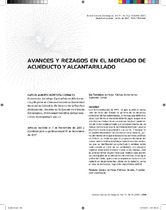Mostrar el registro sencillo del ítem
Avances y rezagos en el mercado de acueducto y alcantarillado
| dc.contributor.author | Montoya Corrales, Carlos Alberto | |
| dc.coverage.spatial | Seccional Medellín | spa |
| dc.date.accessioned | 2021-01-18T20:01:25Z | |
| dc.date.available | 2021-01-18T20:01:25Z | |
| dc.date.issued | 2007 | |
| dc.identifier.issn | 1794-8347 | |
| dc.identifier.uri | http://hdl.handle.net/20.500.11912/7384 | |
| dc.description | p. 233 - 246 | spa |
| dc.description.abstract | Con la Constitución de 1991, el país asumió el doble reto de hacer del Estado un garante de los derechos colectivos de los colombianos, al tiempo que definió el papel que frente al mercado debería jugar, lo que en la práctica se traduciría en un avance hacia el predominio de la actividad privada y el establecimiento de un marco institucional que le permitiera mantener un sano equilibrio entre lo económico y lo social. Y aunque no se pueden desconocer los avances en esta materia, particularmente en lo que a acceso a los servicios públicos se refiere, es evidente que la propuesta derivada del nuevo marco institucional deja todavía muchos vacíos; los que se manifiestan en cobertura y calidad, sobre todo cuando se trata de los pobladores con menores ingresos tanto en los ámbitos rurales como urbanos. Este es precisamente el gran reto que tendrán que asumir los encargados de la prestación de servicios como agua y alcantarillado, que como se expresa en este artículo todavía en departamentos piloto en la materia, como el caso de Antioquia, registran importantes déficit. | spa |
| dc.description.abstract | With the constitution of 1991, the country took on the dual challenge of making a guarantor of the collective rights of Colombians, while defined the role it should play in front of the market, which in practice would mean a step towards the dominance of the private sector and the establishment of an institutional framework that would enable it to maintain a healthy balance between economic and social development. And although you can not ignore developments in this area, particularly with regard to access to public services are concerned, it is clear that the proposal resulting from the new institutional framework still leaves many gaps, which are manifested in coverage and quality, particularly when it comes to people with lower incomes in both rural and urban areas. This is the great challenge that will have to bear the responsibility for the provision of services such as water and sewerage, as expressed in this article still in the pilot departments in the area, such as the case of Antioquia, recorded significant deficit. | spa |
| dc.format.mimetype | application/pdf | |
| dc.language.iso | spa | |
| dc.publisher | Universidad Pontificia Bolivariana | spa |
| dc.relation.ispartof | Revista Ciencias Estratégicas | spa |
| dc.rights | Attribution-NonCommercial-NoDerivatives 4.0 International | * |
| dc.rights.uri | http://creativecommons.org/licenses/by-nc-nd/4.0/ | * |
| dc.subject | Servicios Públicos | spa |
| dc.subject | Estado | spa |
| dc.subject | Privatización y Antioquia | spa |
| dc.subject | Public Service | spa |
| dc.subject | State | spa |
| dc.subject | Privatization and Antioquia | spa |
| dc.title | Avances y rezagos en el mercado de acueducto y alcantarillado | spa |
| dc.type | article | spa |
| dc.rights.accessRights | openAccess | spa |
| dc.type.hasVersion | publishedVersion | spa |
| dc.description.sectional | Medellín | spa |
| dc.identifier.instname | instname:Universidad Pontificia Bolivariana | spa |
| dc.identifier.reponame | reponame:Repositorio Institucional de la Universidad Pontificia Bolivariana | spa |
| dc.identifier.repourl | repourl:https://repository.unab.edu.co/ |


